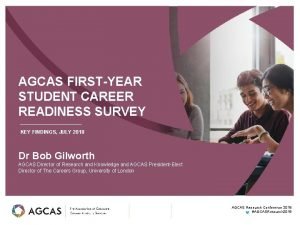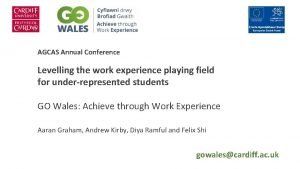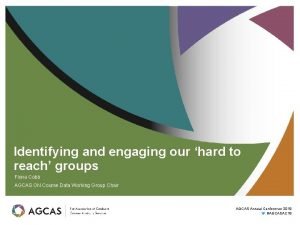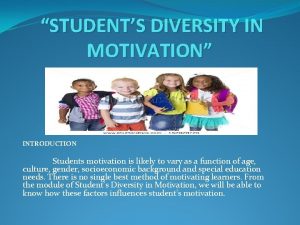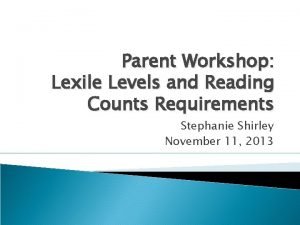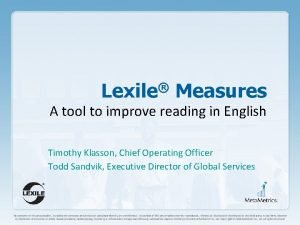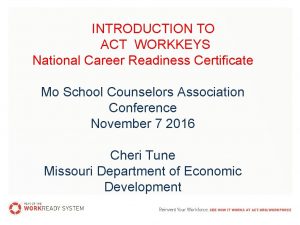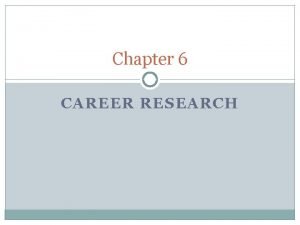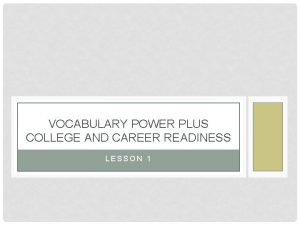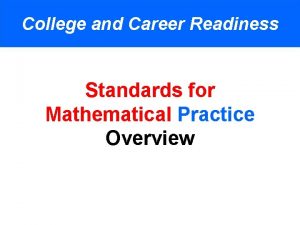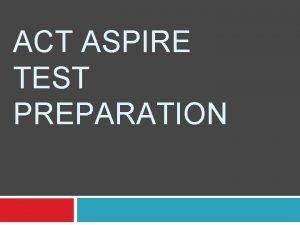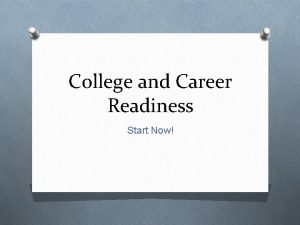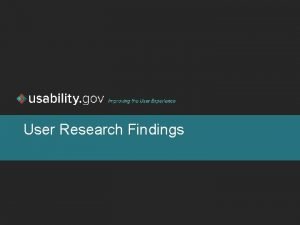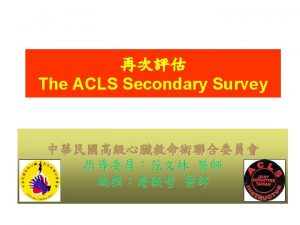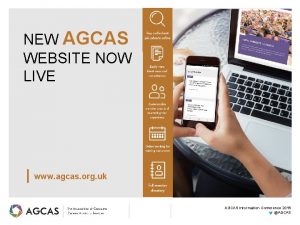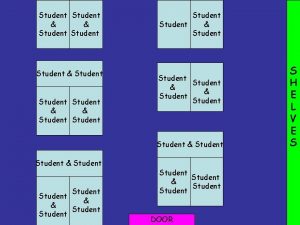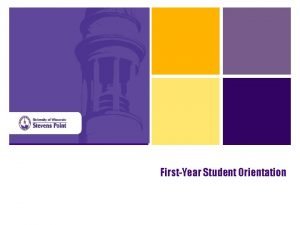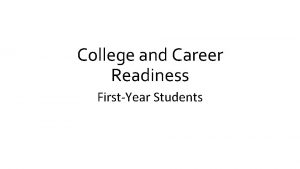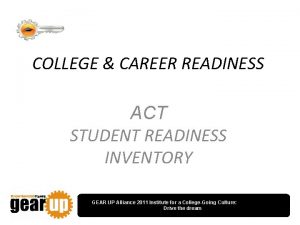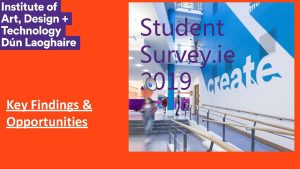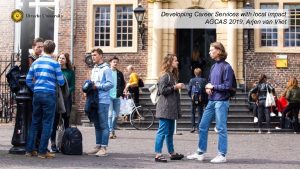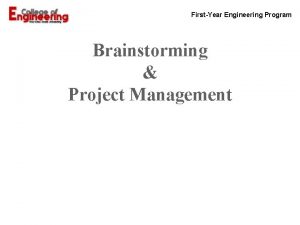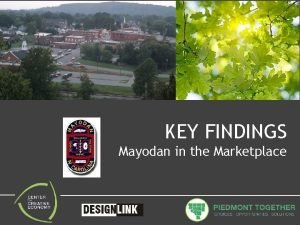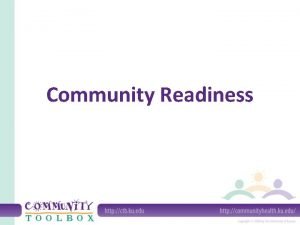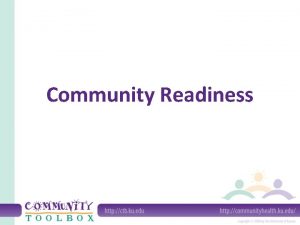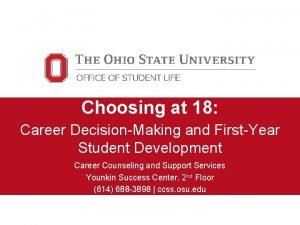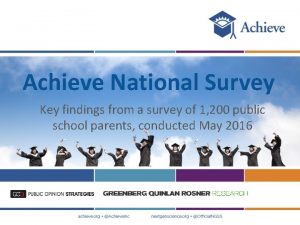AGCAS FIRSTYEAR STUDENT CAREER READINESS SURVEY KEY FINDINGS
















- Slides: 16

AGCAS FIRST-YEAR STUDENT CAREER READINESS SURVEY KEY FINDINGS, JULY 2018 Dr Bob Gilworth AGCAS Director of Research and Knowledge and AGCAS President-Elect Director of The Careers Group, University of London AGCAS Research Conference 2018 #AGCASResearch 2018

Content • Background to the survey • Key findings • Implications AGCAS Research Conference 2018 #AGCASResearch 2018

Why career readiness? • To gain a better understanding of: − how far students have to travel to determine and reach a goal − students’ perceptions of and engagement with social mobility initiatives and careers support • In response to drivers from: – higher education policy – employers in a changing graduate labour market AGCAS Research Conference 2018 #AGCASResearch 2018

Participants • Students who started university study in 2017/2018 − Undergraduate degree or foundation qualification • 19 universities in the UK and the Republic of Ireland • The following key findings have been drawn from the responses of 2008 UK students AGCAS Research Conference 2018 #AGCASResearch 2018

A systematic description Pre-HE CEIAG usage Other Finance Time Pre-HE CEIAG provision Pre-HE careerrelated activities Subject School type Age Cultural capital Accommodation Social capital Expectations of careers support Participation in career-related activities Ethnicity Gender First-generation student? Perceptions of career-related activities Employability skills Clear career ideas? Career selfefficacy AGCAS Research Conference 2018 #AGCASResearch 2018

Key findings Career readiness gaps Capital gaps Pre-HE CEIAG provision gaps Career-planning: 4 Ls model to identify gaps between importance and participation Factors influencing career planning Careers support expected AGCAS Research Conference 2018 #AGCASResearch 2018

Career readiness gaps Two aspects of career self-efficacy and business culture awareness Both parents attended HE Identifying relevant employers and attending Female an interview Communication skills and business culture awareness Determining the steps needed to complete university course Education( state) Asian first-gen. student Male Education (private) Non-Asian Based on the average confidence level scores reported by UK students under 20 AGCAS Research Conference 2018 #AGCASResearch 2018

Capital gaps Cultural capital Social capital Students’ participation in activities before university, e. g. • Students’ involvement in activities in their local community before university • read books for leisure • visit museums/galleries • Students’ sources of advice for university course choice • practise arts • participate in sports • attend summer schools • travel • attend concerts/performances AGCAS Research Conference 2018 #AGCASResearch 2018

Capital gaps Cultural capital Social capital • First-generation university students, BME students, students educated at state schools and mature students brought less cultural capital with them to university. • First-generation university students, BME students, students educated at state schools and mature students brought less social capital with them to university • Male and female students had different cultural capital • Male and female students had different social capital The pattern reported is the same for all students as it is for UK students under 20 AGCAS Research Conference 2018 #AGCASResearch 2018

Pre-HE CEIAG provision gaps CEIAG provision in schools/colleges by type of school (% of UK students under 20) Sessions/talks/presentations about higher education/ apprenticeships/employment options, delivered by teachers/tutors/advisers 88. 8 82. 4 Representatives from universities came to give talks about study opportunities 74. 8 60. 5 Employers came to give talks about employment opportunities 65. 4 50. 3 Other people were invited to inspire students about postschool/college opportunities and career options 81. 3 57. 9 One-to-one careers guidance was available to book 72. 9 There was access to careers sessions, such as how to complete a job application, how to develop networking skills, etc 59. 6 0 UK private 10 20 30 40 50 60 81. 3 69. 2 70 80 90 100 UK state AGCAS Research Conference 2018 #AGCASResearch 2018

Career planning: 4 Ls model to identify gaps Mapping career-related activities at university based on perceived importance and actual participation low importance, high participation Participation top 6 The Leaped The Liked high importance, high participation Importance top 6 low importance, high importance, low participation The Left The Lagged AGCAS Research Conference 2018 #AGCASResearch 2018

Career planning: gaps between importance and participation Access the careers service website to get careers information (21%, 16%) Attend a careers fair (21%, 18%) Participation top 6 The Leaped The Liked Make new friends (63%, 75%) Get a part-time job (45%, 32%) Join a university society (34%, 42%) Do some volunteering (34%, 14%) Importance top 6 Sign up to a programme to build new skills (24%, 9%) Go to the careers service (15%, 9%) Develop a social media/blog/website (11%, 7%) Apply for work experience (41%, 10%) Start networking with professionals (35%, 8%) Join a religious group (4%, 6%) The Lagged The Left Based on the responses of 2008 students AGCAS Research Conference 2018 #AGCASResearch 2018

Factors influencing career planning Time: first-generation university students and mature students reported greater time constraints. Finance: Financial pressures limited some students’ participation in cocurricular activities. Family: living at home might play a role in Asian students’ lagged action in undertaking career-related activities at university. Capital: First-generation university students’ low social capital preentry does not improve at university, with low participation in social activities. AGCAS Research Conference 2018 #AGCASResearch 2018

Careers support expected from university careers services by age 51. 9 47. 1 Help me develop a career plan Provide opportunities to practise recruitment activities (e. g. interviews and assessment centres) 50. 3 56. 5 Provide practical support with job search and CVs/applications 60. 0 Advertise work experience/internships suitable for students 59. 4 Help me make career choices 59. 6 56. 9 Help me understand my options 66. 1 66. 2 65. 3 71. 2 62. 3 60. 7 Provide opportunities to meet employers 72. 1 67. 6 Advertise job opportunities suitable for students 0 Mature students 10 20 30 40 50 60 70 80 Younger students AGCAS Research Conference 2018 #AGCASResearch 2018

Recommendations • HE careers sector: consider innovation in engaging students and develop effective, segmented communication to change students’ perceptions of career planning and raise awareness of activities that are important to future careers. • Universities: pre-entry engagement activities should not only be organised and delivered with targeted students, but also with their parents/guardians and communities in mind. • Policy: the significant gaps between students educated at state schools and students educated at private schools cannot be narrowed without policy change, financial investment and supporting resources. AGCAS Research Conference 2018 #AGCASResearch 2018

AGCAS FIRST-YEAR STUDENT CAREER READINESS SURVEY KEY FINDINGS – JULY 2018 Dr Bob Gilworth AGCAS Director of Research and Knowledge and AGCAS President-Elect Director of The Careers Group, University of London AGCAS Research Conference 2018 #AGCASResearch 2018
 Career readiness survey
Career readiness survey Agcas conference
Agcas conference Agcas conference
Agcas conference Students diversity in motivation reflection
Students diversity in motivation reflection Sri reading counts
Sri reading counts What do lexile levels mean
What do lexile levels mean National career readiness certificate
National career readiness certificate Chapter 6 career readiness review
Chapter 6 career readiness review Win career readiness courseware
Win career readiness courseware Vocabulary power plus for college and career readiness
Vocabulary power plus for college and career readiness College and career readiness standards math
College and career readiness standards math Career readiness self assessment
Career readiness self assessment The aspire test helps to measure and career readiness
The aspire test helps to measure and career readiness Career readiness checklist
Career readiness checklist Findings in research
Findings in research Abcde acls
Abcde acls Stem career cluster vocabulary
Stem career cluster vocabulary
